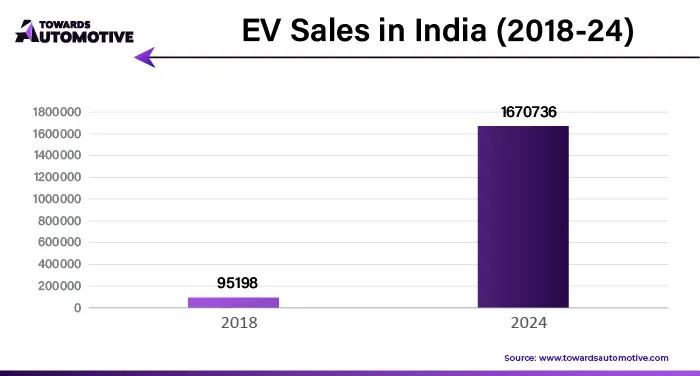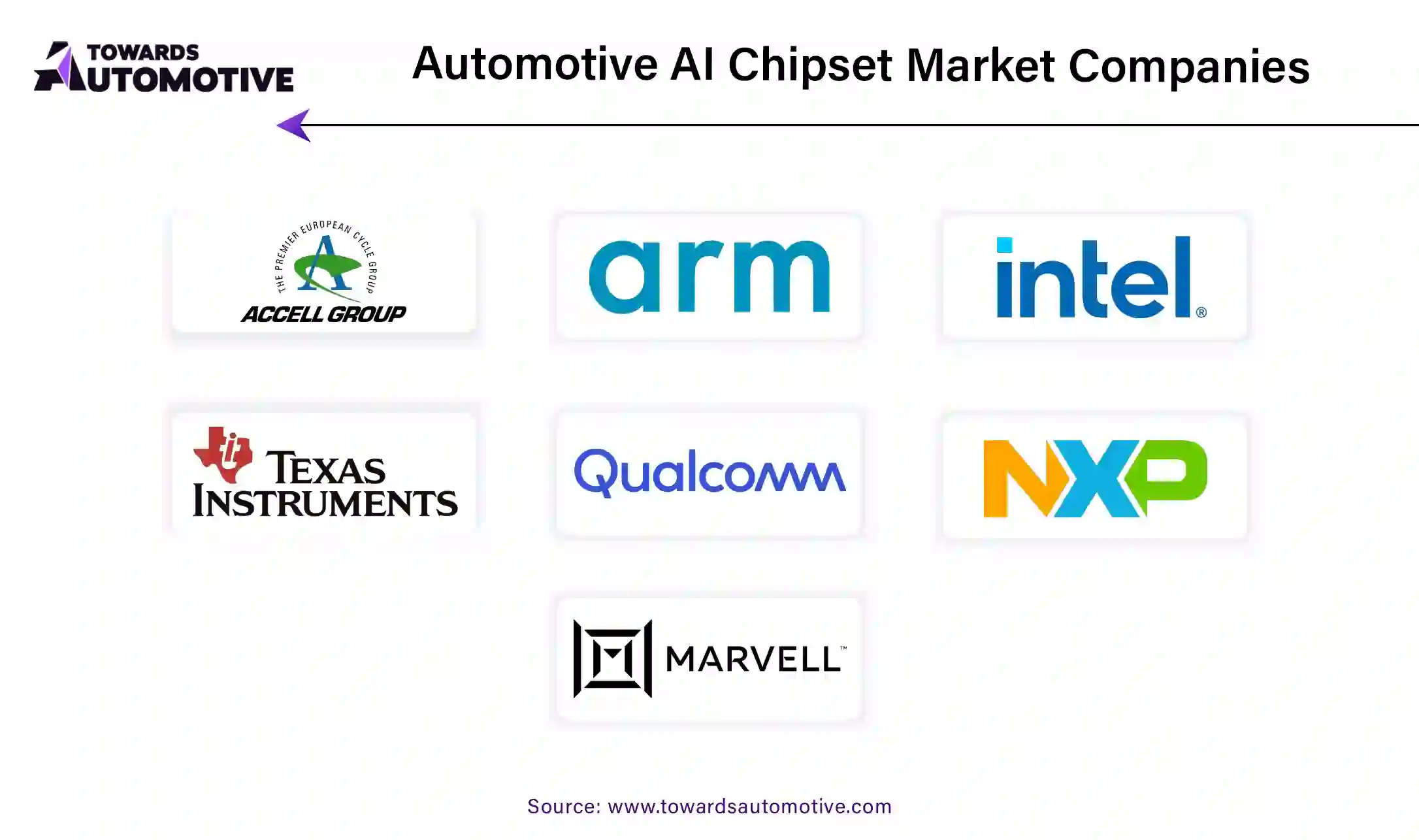October 2025
The automotive AI chipset market is forecasted to expand from USD 2.86 billion in 2025 to USD 14.68 billion by 2034, growing at a CAGR of 20% from 2025 to 2034.

The automotive AI chipset market is experiencing rapid growth, driven by the increasing integration of artificial intelligence (AI) into modern vehicles. AI chipsets are critical components that enable vehicles to process large volumes of data from various sensors, enabling advanced functionalities such as Advanced Driver-Assistance Systems (ADAS), autonomous driving, in-vehicle infotainment systems, and vehicle connectivity. These chipsets are designed to handle complex algorithms, ensuring real-time decision-making, efficient data processing, and improved safety for drivers and passengers. With the automotive industry evolving towards smarter, safer, and more efficient vehicles, AI chipsets play a key role in enabling the next generation of mobility.
A primary driver of this market is the increasing demand for autonomous vehicles (AVs) and ADAS, as AI is central to the functioning of these technologies. AI chipsets are essential for processing data from multiple sensors such as radar, LiDAR, and cameras, allowing vehicles to detect objects, recognize traffic signals, make decisions, and navigate complex driving environments. Furthermore, the growing emphasis on electric vehicles (EVs) also boosts the demand for AI chipsets, as EVs increasingly incorporate AI technologies for energy management, autonomous driving, and connected vehicle features.
Additionally, as consumer preferences shift towards more connected and intelligent vehicles, automakers are increasingly integrating AI-powered infotainment systems, voice recognition, and personalized driving experiences. The demand for seamless connectivity and smart technologies drives the need for high-performance AI chipsets that can process large datasets with low latency. The evolving regulatory environment, especially in regions like North America and Europe, which mandates ADAS features for safety compliance, further accelerates the growth of the automotive AI chipset market. With continuous advancements in AI, machine learning, and sensor technologies, the automotive AI chipset market is poised for substantial growth in the coming years.
Artificial Intelligence (AI) plays a pivotal role in the automotive AI chipset market by enabling advanced functionalities that are transforming vehicles into smarter, safer, and more efficient systems. AI chipsets are essential for processing the vast amounts of data collected from a vehicle’s sensors, cameras, radar, and LiDAR systems. These chipsets power technologies such as Advanced Driver-Assistance Systems (ADAS), autonomous driving, and in-car infotainment, which rely on real-time data processing and decision-making.
In ADAS, AI chipsets analyze sensor data to enable features like lane-keeping assist, collision avoidance, adaptive cruise control, and automatic emergency braking, significantly improving road safety. AI is crucial for autonomous vehicles (AVs), where AI chipsets interpret data from a combination of sensors to make instant decisions, allowing the vehicle to navigate complex environments without human intervention. As AVs become more prevalent, the demand for powerful AI chipsets that can handle high computational loads and provide low-latency decision-making continues to grow.
AI also enhances vehicle connectivity, enabling advanced features such as voice recognition, personalized in-car experiences, and over-the-air software updates. Additionally, AI chipsets help optimize electric vehicle (EV) systems by managing battery life, charging, and energy efficiency, ensuring optimal performance. As the automotive industry moves toward smart cities and connected transportation, AI chipsets are fundamental in ensuring seamless vehicle-to-vehicle and vehicle-to-infrastructure communication.
The growing demand for electric vehicles (EVs) is significantly driving the growth of the automotive AI chipset market. As the automotive industry shifts towards sustainable and energy-efficient solutions, EVs have gained widespread adoption. This transition is accompanied by the increasing integration of advanced technologies, such as autonomous driving, Advanced Driver-Assistance Systems (ADAS), and connected car systems, all of which rely heavily on AI chipsets for real-time data processing and decision-making.
AI chipsets are essential in optimizing the performance of EVs, especially when it comes to energy management, battery optimization, and enhancing vehicle autonomy. For instance, AI-powered systems in EVs help manage battery life by analyzing usage patterns, optimizing charging cycles, and predicting maintenance needs, thereby extending the vehicle's overall lifespan. Furthermore, EVs with advanced AI chipsets can offer features such as intelligent navigation, energy-efficient route planning, and dynamic driving performance adjustments based on road conditions and driving behavior. These features are crucial to making EVs more efficient, user-friendly, and appealing to consumers.
The integration of autonomous driving capabilities in EVs further increases the demand for AI chipsets. As automakers push towards fully autonomous electric vehicles, AI chipsets must process large volumes of data from cameras, LiDAR, radar, and other sensors to enable safe and reliable autonomous navigation. These chipsets must also provide low-latency decision-making capabilities to ensure that autonomous systems can react instantaneously to changing driving conditions. Additionally, the growing focus on vehicle connectivity and smart mobility means that EVs are equipped with advanced infotainment, telematics, and communication systems, all of which require AI chipsets to deliver seamless and personalized user experiences.
As consumer interest in EVs continues to rise and automakers focus on integrating cutting-edge AI technologies into their electric vehicles, the demand for AI chipsets in the EV sector is expected to accelerate, driving significant growth in the automotive AI chipset market.

The AI chipset market faces restraints such as high development and manufacturing costs, which can limit accessibility for smaller players. Additionally, the rapid pace of technological advancements creates challenges in ensuring chipsets remain compatible with evolving AI algorithms. Supply chain disruptions and the complexity of integrating AI into existing automotive systems further hinder market growth.
The rise of autonomous vehicles (AVs) is creating significant opportunities in the automotive AI chipset market. Autonomous vehicles rely heavily on artificial intelligence (AI) to process and interpret vast amounts of data in real-time, making them one of the most demanding applications for AI chipsets in the automotive industry. AI chipsets are responsible for powering the key technologies in AVs, including object recognition, path planning, decision-making, and vehicle control. These vehicles are equipped with sensors such as cameras, LiDAR, radar, and ultrasonic sensors that constantly feed data to the AI system. The AI chipset processes this data to enable the vehicle to detect objects, navigate complex environments, and make safe, real-time decisions, which is critical for ensuring the vehicle can drive without human intervention.
As the development of fully autonomous vehicles progresses, there is a growing demand for advanced AI chipsets that offer high-performance computing capabilities, low latency, and enhanced reliability. These chipsets need to process data from multiple sources quickly and efficiently, which is crucial for ensuring safety and performance in autonomous driving. The increasing push from automakers, technology companies, and governments to develop self-driving cars further accelerates the need for advanced AI chipsets that can meet the challenges of fully autonomous driving.
Moreover, autonomous vehicles are expected to be a key part of the future of mobility, particularly in smart cities and shared transportation systems. This creates opportunities for AI chipset providers to expand their market share by offering chipsets specifically designed for autonomous driving systems. With the continued investment in AI technologies, research, and development of AVs, the demand for powerful AI chipsets will only grow, presenting significant growth opportunities for the automotive AI chipset market in the coming years.
The advanced driver assistance systems segment held the largest share of the market. Advanced Driver-Assistance Systems (ADAS) play a pivotal role in driving the growth of the automotive AI chipset market. ADAS technologies, which include features such as lane departure warning, automatic emergency braking, adaptive cruise control, parking assistance, and collision avoidance, rely heavily on AI chipsets to process vast amounts of data in real-time. These systems use data from sensors like cameras, radar, and LiDAR, which need to be interpreted instantly to make critical driving decisions. AI chipsets are essential in enabling this data processing, allowing vehicles to operate safely and intelligently.
As ADAS becomes increasingly standard in both high-end and mass-market vehicles, the demand for AI chipsets continues to surge. Automakers are now integrating AI-driven ADAS features across a wide range of passenger vehicles, not only improving driver and passenger safety but also enhancing the overall driving experience. The need for AI-powered systems to interpret real-time data from these sensors and make autonomous decisions pushes the adoption of advanced chipsets with high computational power, low latency, and energy efficiency.
Additionally, the push towards autonomous vehicles is fueling the demand for AI chipsets as ADAS is seen as a stepping stone towards full autonomy. In fully autonomous vehicles, AI chipsets will be responsible for processing data from numerous sources, making split-second decisions, and enabling communication with other vehicles and infrastructure. As a result, the integration of ADAS is not just boosting the demand for AI chipsets in today's vehicles, but also laying the groundwork for the future of self-driving cars.
The regulatory push in regions like North America and Europe, which mandates ADAS features for safety and compliance, further accelerates the adoption of these technologies, providing a strong growth trajectory for the automotive AI chipset market.
The passenger vehicles segment is expected to rise with a significant growth rate during the forecast period. Passenger vehicles are a major driving force behind the growth of the automotive AI chipset market. With the increasing integration of advanced driver-assistance systems (ADAS) and the push towards autonomous driving, AI chipsets have become essential for enhancing vehicle safety, performance, and user experience. In passenger vehicles, AI chipsets are used to power critical systems such as adaptive cruise control, lane departure warning, automatic emergency braking, and collision avoidance. As automakers in regions like North America and Europe push to incorporate these technologies into mass-market passenger vehicles, the demand for AI chipsets rises significantly.
Moreover, the growing trend of connected vehicles also fuels the need for AI chipsets. Modern passenger vehicles are equipped with infotainment systems, navigation, and real-time data processing capabilities that rely heavily on AI chipsets to deliver personalized, efficient services. Consumers expect seamless connectivity with their devices, enhanced navigation, and intelligent traffic management systems, all of which are driven by AI-powered systems.
The ongoing shift towards electric vehicles (EVs) further boosts the automotive AI chipset market. AI chipsets optimize the performance of electric drivetrains, battery management systems, and energy efficiency in EVs, while also powering the smart features that consumers increasingly expect. Additionally, the rise in demand for semi-autonomous and fully autonomous vehicles in the passenger segment propels the need for increasingly sophisticated AI chipsets, capable of real-time processing and decision-making. As automakers continue to develop more intelligent, connected, and electric vehicles, the growth of the automotive AI chipset market is set to accelerate.

North America dominated the automotive AI chipset market. The growth of the automotive AI chipset market in North America is driven by several key factors. Firstly, the rising demand for advanced driver-assistance systems (ADAS) and autonomous vehicles (AVs) is a major driver. AI chipsets are integral to these systems, enabling features like lane-keeping, adaptive cruise control, and automated parking, which are becoming increasingly popular in North American vehicles. Secondly, the rapid advancements in AI and machine learning technologies are accelerating the adoption of AI chipsets in the automotive sector. AI chipsets are critical for processing the large amounts of data required for real-time decision-making in autonomous vehicles, enhancing vehicle safety and performance.
Thirdly, the supportive regulatory environment in North America, with increased investments in smart transportation infrastructure and autonomous vehicle testing, is accelerating the development and deployment of AI-driven technologies in vehicles.
Europe is expected to grow with a notable CAGR during the forecast period. Europe is a global leader in electric vehicles (EVs), and the growing EV market drives the need for AI chipsets in these vehicles. AI chipsets are crucial for optimizing energy management, battery efficiency, and driving assistance systems in EVs, leading to greater adoption of AI-driven technologies.
Moreover, collaborations between automakers and tech companies are increasing, with several partnerships focusing on AI-powered innovations. These collaborations foster the development of next-generation AI chipsets specifically designed for automotive applications, further expanding the market. Additionally, the rising demand for connected vehicles in Europe, offering enhanced infotainment, navigation, and safety features, is fueling the growth of automotive AI chipsets. As consumers demand more advanced technology, automakers are increasingly turning to AI solutions to meet these expectations.

By Application
By Technology
By Type
By End Use
By Region
October 2025
October 2025
October 2025
October 2025
We offer automotive expertise for market projections and customizable research, adaptable to diverse strategic approaches.
Contact Us